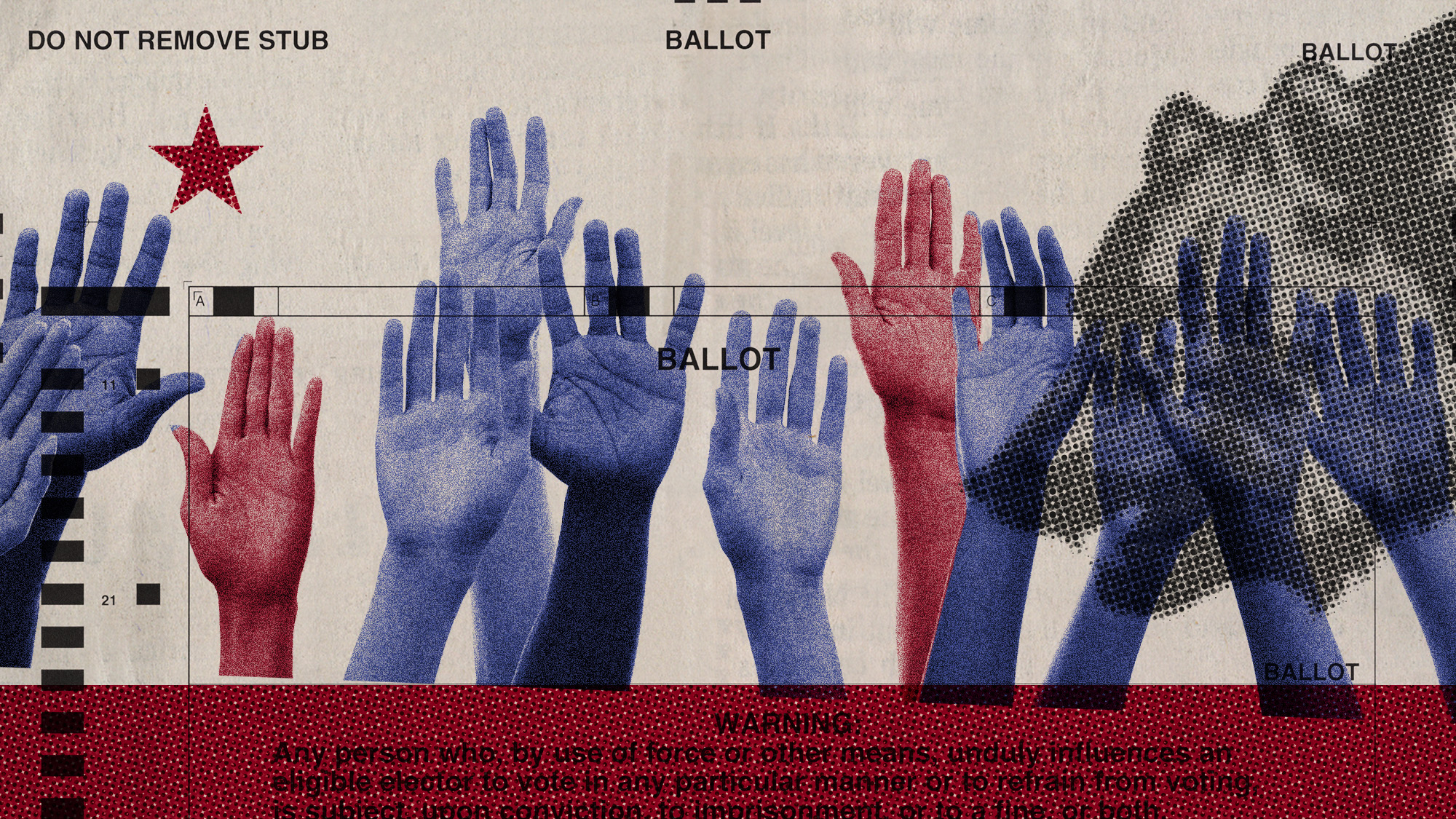How a SCOTUS case about fishing could upend government agencies
The right-leaning Supreme Court is poised to rewrite the rules of government in its own favor


A free daily email with the biggest news stories of the day – and the best features from TheWeek.com
You are now subscribed
Your newsletter sign-up was successful
"For want of a nail" is an oft-repeated proverb detailing how small, seemingly insignificant things can have a cascading effect that may ultimately bring about misfortune and ruin on a dramatically larger scale. Cited by such luminaries as Benjamin Franklin and James Baldwin, the phrase is the spiritual progenitor to the "Domino Effect" meme that's frequently deployed to highlight some unlikely sequence of events in ascending order of impact. It is, in other words, the perfect metaphor for what may end up being one of the most consequential court cases of the past half-century. It starts with herring.
What's the case about?
The U.S. Supreme Court announced that it will in the coming term hear the case of Loper Bright Enterprises v. Raimondo, a challenge by a New Jersey-based herring fishing company against Commerce Secretary Gina Raimondo that could very well upend one of the longstanding precedents for how various government agencies and departments function. In particular, the case challenges the Magnuson-Stevens Act, a 1976 law that regulates maritime fishing in federal waters. In its complaint, Loper Bright alleges that the act's requirement for a government observer to not only be onboard during certain fishing expeditions but — in some cases — for the fishing companies themselves to cover that observer's salary is fundamentally not in the National Marine Fisheries Service's (NMFS) purview to enforce.
Here's where things escalate from "herring" to "government-wide precedent."
The Week
Escape your echo chamber. Get the facts behind the news, plus analysis from multiple perspectives.

Sign up for The Week's Free Newsletters
From our morning news briefing to a weekly Good News Newsletter, get the best of The Week delivered directly to your inbox.
From our morning news briefing to a weekly Good News Newsletter, get the best of The Week delivered directly to your inbox.
While specifically questioning the Magnuson-Stevens Act, the core of Loper Bright's case against the NMFS (and its supervisory body, the Commerce Department) asks whether the agency had the authority to apply its rules the way it did — authority ceded to it under what's known as the Chevron Deference principle. Established in 1984 after the court ruled in Chevron U.S.A., Inc. v. Natural Resources Defense Council, Inc, the Deference principle effectively holds that in cases where a government agency's specific statutory authority is unclear based on how Congress crafted the statute, the court will then defer to that agency for interpretation, rather than decide for itself. It's this principle, one which for nearly 40 years has determined when and how various government agencies conduct their own business, that is ultimately being threatened by the case. As attorneys for Loper Bright wrote in their initial complaint to the court: "Whether by clarifying Chevron or overruling it, this court should grant review and reverse the clear agency overreach at issue here."
Big fish, or an empty net?
The Chevron ruling has long been in conservative crosshairs, and both Justices Neil Gorsuch and Clarence Thomas have written against the precedent in the past. Accordingly, a host of right-leaning groups have weighed in on Loper Bright's behalf, with organizations like the Cato Institute, Christian Employers Alliance, and the National Right to Work Legal Defense Foundation all filing briefs in support of the fishing company. Conversely, liberal observers have warned that eliminating Chevron could lead to a seismic reorganization of governmental authority.
"This would have the potential of being one of the most destabilizing decisions that this court has issued, if it chooses to go there," Center for Progressive Reform senior policy analyst James Goodwin told Politico after the court agreed to hear the case.
"Biden's environmental and energy agencies were already facing a heavily tilted playing field in the federal judiciary," Goodwin added. "I think eliminating Chevron ... would make the prospects of surviving judicial review all the more daunting."
A free daily email with the biggest news stories of the day – and the best features from TheWeek.com
To give a sense of how widespread Chevron is across the federal government, consider that when Gorsuch, arguably the court's chief Chevron opponent, was nominated to the Supreme Court bench, the precedent had been cited more than 80,000 times. But even if it's overturned by the court, that's no guarantee the sprawling "administrative state" of government agencies and departments will contract accordingly.
"Some who oppose the principle of Chevron seem to think it is a magical elixir that will tame what they see as too vast a bureaucracy," University of California, Berkley law professor Steven Davidoff Solomon wrote in The New York Times ahead of Gorsuch's confirmation hearings. "That seems silly — at its heart such a doctrine is merely a judicial tool. Whether the bureaucracy shrinks or grows depends on what Congress and the president do."
In other words: While the court considers herring, it may ultimately be up to the other two branches of government to reel in real change.
Rafi Schwartz has worked as a politics writer at The Week since 2022, where he covers elections, Congress and the White House. He was previously a contributing writer with Mic focusing largely on politics, a senior writer with Splinter News, a staff writer for Fusion's news lab, and the managing editor of Heeb Magazine, a Jewish life and culture publication. Rafi's work has appeared in Rolling Stone, GOOD and The Forward, among others.
-
 6 of the world’s most accessible destinations
6 of the world’s most accessible destinationsThe Week Recommends Experience all of Berlin, Singapore and Sydney
-
 How the FCC’s ‘equal time’ rule works
How the FCC’s ‘equal time’ rule worksIn the Spotlight The law is at the heart of the Colbert-CBS conflict
-
 What is the endgame in the DHS shutdown?
What is the endgame in the DHS shutdown?Today’s Big Question Democrats want to rein in ICE’s immigration crackdown
-
 Trump reclassifies 50,000 federal jobs to ease firings
Trump reclassifies 50,000 federal jobs to ease firingsSpeed Read The rule strips longstanding job protections from federal workers
-
 Supreme Court upholds California gerrymander
Supreme Court upholds California gerrymanderSpeed Read The emergency docket order had no dissents from the court
-
 Gavin Newsom and Dr. Oz feud over fraud allegations
Gavin Newsom and Dr. Oz feud over fraud allegationsIn the Spotlight Newsom called Oz’s behavior ‘baseless and racist’
-
 A running list of the US government figures Donald Trump has pardoned
A running list of the US government figures Donald Trump has pardonedin depth Clearing the slate for his favorite elected officials
-
 How robust is the rule of law in the US?
How robust is the rule of law in the US?TODAY’S BIG QUESTION John Roberts says the Constitution is ‘unshaken,’ but tensions loom at the Supreme Court
-
 ‘These attacks rely on a political repurposing’
‘These attacks rely on a political repurposing’Instant Opinion Opinion, comment and editorials of the day
-
 A crowded field of Democrats is filling up the California governor’s race
A crowded field of Democrats is filling up the California governor’s raceIn the Spotlight Over a dozen Democrats have declared their candidacy
-
 The ‘Kavanaugh stop’
The ‘Kavanaugh stop’Feature Activists say a Supreme Court ruling has given federal agents a green light to racially profile Latinos
